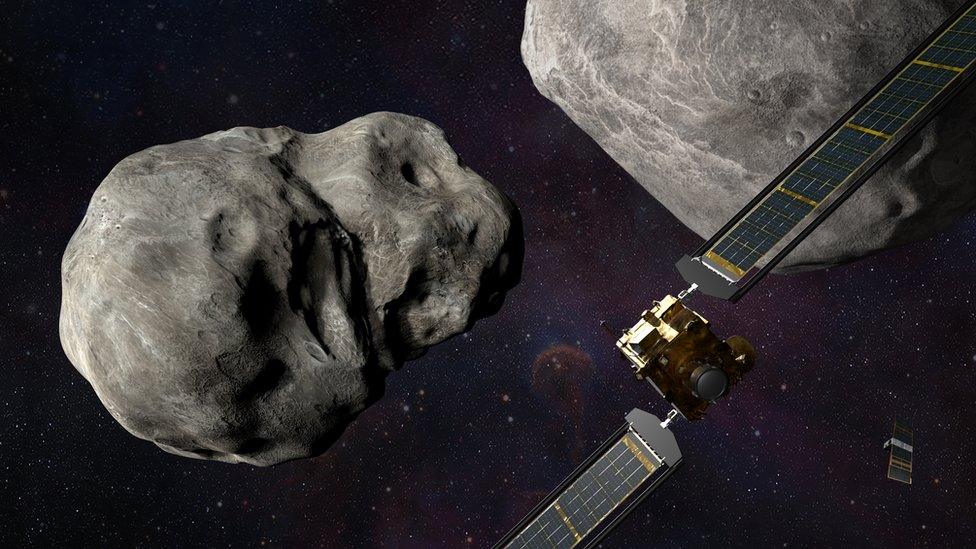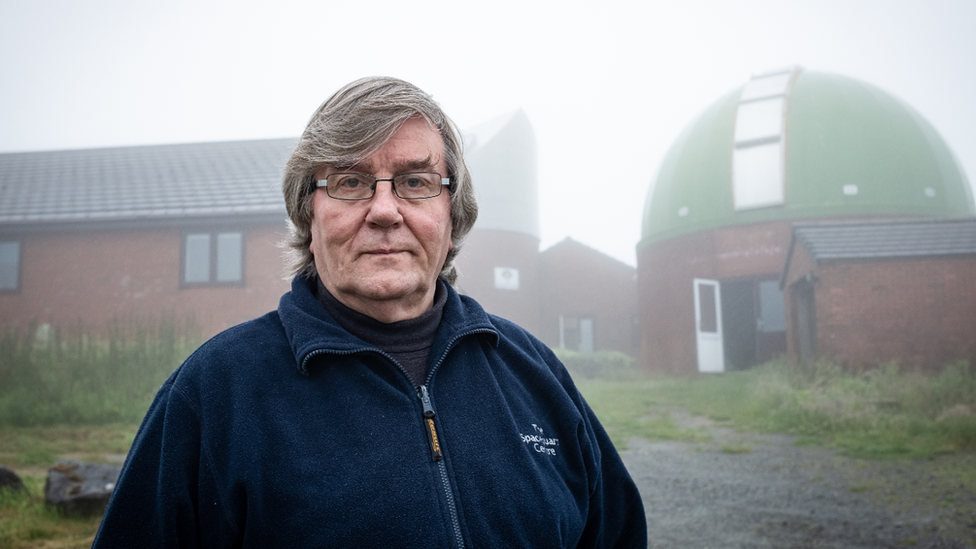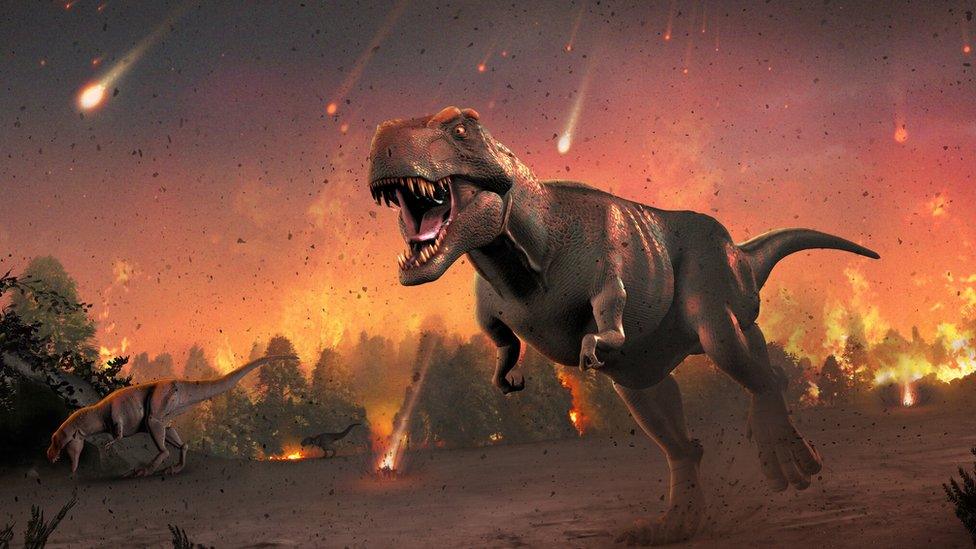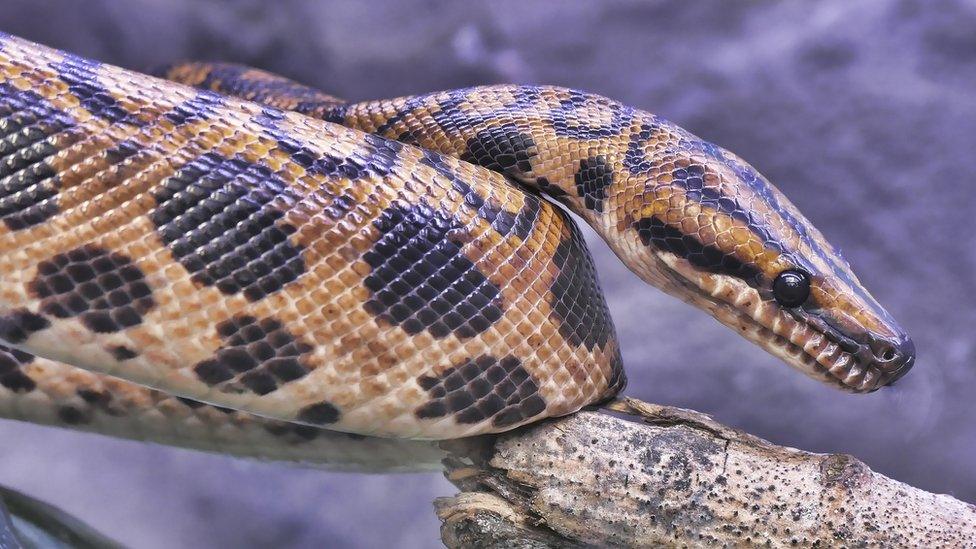Don't Look Up: What's the plan to deal with asteroids and comets?
- Published

An illustration of Nasa's 'Dart' mission to test asteroid-smashing technology.
It's understandable if the thought of a comet wiping out all life on earth might be an extra worry you just don't need right now.
But if you've watched Netflix movie Don't Look Up, it might be hard to get the thought out of your mind.
It's a popular Hollywood plot, but space scientists say it's also a real-life scenario the human race needs to be prepared for.
So - are we?
"Planet-killing asteroids impact the earth every 50 million years," Professor Monica Grady, the Professor of Planetary and Space Sciences at the Open University, tells Radio 1 Newsbeat.
"The last one impacted 65 million years ago, so you could say we're 15 million years overdue for another one."
But she says we just need to "keep calm and don't panic", because clever people like her are working on it.
Comets and asteroids both orbit the sun. The difference between the two is that comets are made of ice and dust, while asteroids are solid rock.
When, not if?
"Like all good satires, Don't Look Up has a lot of truth buried in it," says Professor Grady.

Don't Look Up stars Meryl Streep (centre-right) as a US president warned about an approaching comet set to destroy the planet.
"This scenario of a comet on a collision course with the earth is utterly probable - indeed, certain."
This is the bad news.
"With any luck, we'll have years to prepare, but then again, we might not.
"It might come from an unusual trajectory, it might come from out of the sun, it might be a different kind of interstellar object."
But there is some good news: work is being done right now to try to reduce the chances of a major impact.
Our 'best hope'
In November, a spacecraft was launched on a mission to test technology that could one day knock a dangerous asteroid off course.
Nasa's 'Dart' (Double Asteroid Redirection Test) is on its way to a pair of asteroids that closely orbit each other: "It's going to crash into the smaller of the two asteroids [Dimorphos]," Professor Grady explains.
Dart is set to meet its target in September, when "telescopes will be able to see how much energy is needed to deflect the asteroid's orbit" around its bigger companion.

Fortunately for us, it's just an experiment and not a plan to save the world, but if it's successful, it could help design future missions to other objects on course for our planet.
"If we move an asteroid a little bit in its orbit when it's far away, then it will miss the earth by miles."
This method of deflecting an asteroid is known as the kinetic impactor technique, and Professor Grady believes it's "the most promising method we've got - the best hope".
However, "there's all sorts of other schemes that have been discussed," she says.
Another involves painting one side of the object white, while leaving the other side "very, very dark: The white reflects the sun, and the black absorbs it, so it'll change the way it spins and the way it moves," potentially directing it away from earth.
Fans of nineties movies such as Armageddon and Deep Impact will also be familiar with the idea of trying to destroy an asteroid or comet by detonating a bomb.
Eyewitnesses and CCTV cameras captured the moment the Chelyabinsk meteor flew across the sky
'Wake up call'
"Films like this do serve as a wake up call," says Professor Grady.
"It brings the problem into people's consciousness."
But she assures us that things would be unlikely to play out as they do in Don't Look Up, when the US president is reluctant to take the threat seriously.
"In real life, it is not down to the American president," Monica says.
"It's international. All the space agencies and governments work together".
"There's a well-known method for scientists reporting new incoming asteroids, and there is the NASA Planetary Defence Office - they work very closely with the United Nations".
'Don't worry'
Despite the threat being a real one, Monica says there's no need to panic… yet.
"Scientists and engineers are doing the best they can, and it's now on government risk registers. So I think as much is being done at the moment as it's possible to do - don't worry."
"This is not a signal to start buying pasta and hoarding toilet rolls," she says.
"If and when this happens, there will be plenty of notice, and every single thing will be tried before we get to a stage when we have to panic."
However she adds, "we mustn't be too satisfied, we must keep looking".

Follow Newsbeat on Instagram, external, Facebook, external, Twitter, external and YouTube, external.
Listen to Newsbeat live at 12:45 and 17:45 weekdays - or listen back here.
Related topics
- Published12 April 2020

- Published28 June 2020

- Published26 May 2020

- Published14 September 2021
